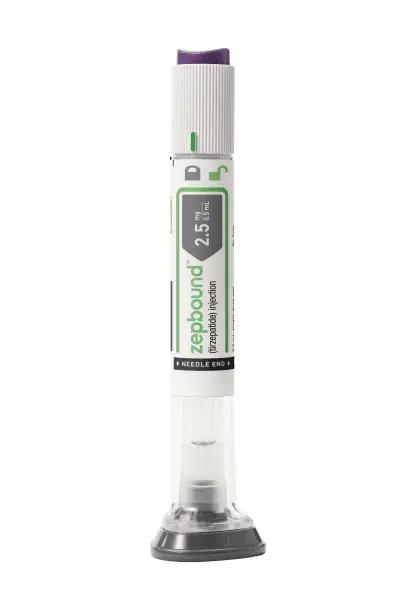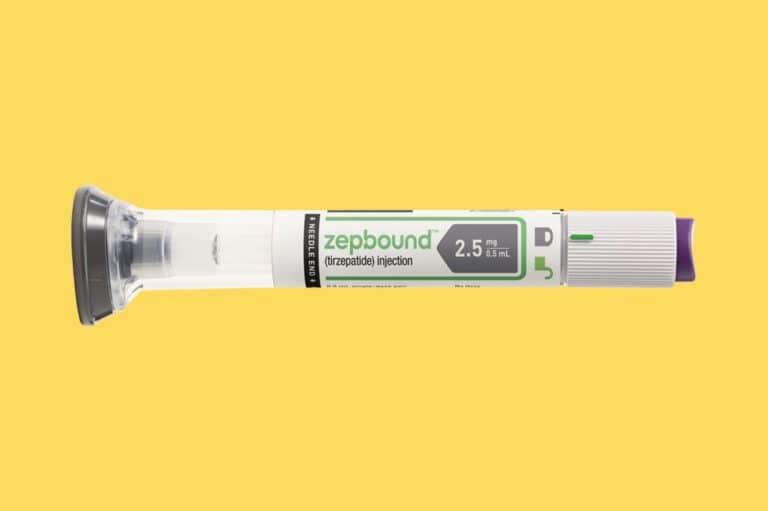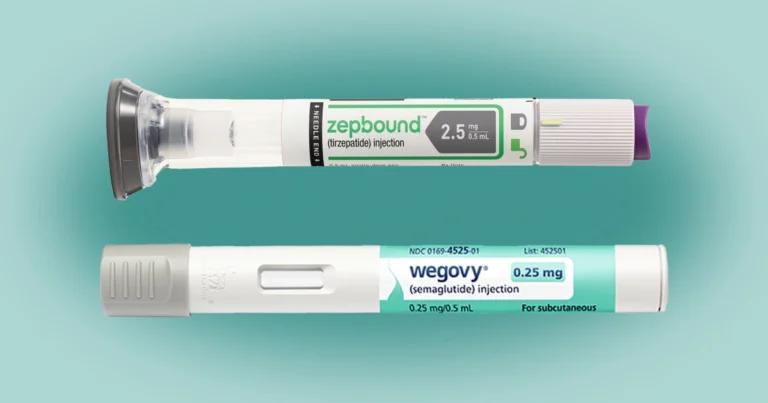
In the realm of medical treatments for obesity and type 2 diabetes, two drugs stand at the forefront: Semaglutide and the recently FDA-approved Zepbound. Semaglutide, manufactured by Novo Nordisk, known by its brand name Wegovy, for weight loss and Ozempic, for diabetes management, harnesses the power of GLP-1 receptor agonists, to modulate blood sugar and facilitate weight management. Zepbound enters the scene as a potent newcomer, blending the actions of GLP-1 and GIP receptors and has quickly gained a reputation as a leading weight loss drug.
Comparing these cutting-edge therapies, this article will explore the respective efficacy and safety profiles of semaglutide injections and Zepbound, delving into their roles as weight loss and diabetes medication, including potential side effects and considerations for individuals with specific medical histories, such as gallbladder disease. How does semaglutide work, and how does Zepbound compare? These are crucial discussions for understanding advanced obesity treatments and developing a comprehensive view of chronic weight management strategies.
What is Zepbound?
Zepbound is an innovative injectable medication specifically designed for chronic weight management in adults. It contains tirzepatide, the same compound found in Mounjaro, which is utilized for type 2 diabetes management. The medication operates as a dual-agonist, targeting both GLP-1 and GIP hormone pathways, which are instrumental in regulating appetite and insulin secretion. Here are some key points about Zepbound:
Composition and function:
- Contains tirzepatide, a compound also present in the diabetes medication Mounjaro
- Includes semaglutide and an additional hormone, GIP, to increase insulin secretion further and decrease appetite
- Acts as a dual agonist, activating both GLP-1 and GIP receptors
Dosage and administration:
- Administered as a 2.5 mg weekly injection for the first month, then potentially increased to 5 mg weekly
- Dosage can be adjusted, with a maximum of 15 mg per week depending on individual needs and doctor’s guidance
Indications and usage:
- Approved for use in adults 18 years and older with a body mass index (BMI) of 30 or higher (obese), or a BMI of 27 or higher (overweight) with at least one weight-related health condition
- To be used alongside a reduced-calorie diet and increased physical activity for optimal results
- Continuous usage may be necessary for maintaining weight loss, and patients should consider the benefits in relation to potential side effects and costs
The efficacy of Zepbound in aiding weight loss is notable, with clinical trials showcasing significant results. For instance, a 17-month study revealed sustained weight loss among participants, with average reductions of 15.0% for the 5 mg dose, 19.5% for the 10 mg dose, and 20.9% for the 15 mg dose. However, the drug’s safety profile warrants attention, as it carries a boxed warning for the risk of thyroid cancer, among other side effects. Patients must consult with their healthcare providers to understand the implications of Zepbound’s use, especially considering the potential for serious side effects such as severe nausea, gallbladder problems, pancreatitis, and low blood sugar.
In summary, Zepbound represents a significant advancement in the treatment of obesity and overweight conditions in adults, with the dual mechanism of action offering a new approach to weight management. It is essential for patients to be aware of the medication’s administration, indications, and potential side effects, and to engage in an informed dialogue with a healthcare professional to determine if Zepbound is a suitable option for their weight management goals.
What is semaglutide?
Semaglutide is a versatile medication with a significant role in the management of type 2 diabetes and weight loss. This drug is a glucagon-like peptide-1 (GLP-1) receptor agonist, which mimics the natural hormone GLP-1, enhancing insulin secretion and promoting satiety. Here are the key aspects of semaglutide:
Mechanism of action:
- Semaglutide interacts with parts of the brain that regulate appetite, leading to reduced hunger and calorie intake
- It slows down digestion, allowing for a more gradual absorption of glucose and maintaining blood sugar levels
Usage and brand names:
- For type 2 diabetes treatment, semaglutide is known as Ozempic and Rybelsus, with Rybelsus being the oral tablet form
- Under the brand name Wegovy, semaglutide is used specifically for chronic weight management in adults who are overweight or obese, with at least one weight-related health condition
Dosage and administration:
- The typical dosage for weight loss is 2.4 milligrams once weekly as a subcutaneous injection
- For diabetes management, the dose may vary. It is available as both an injectable (Ozempic) and an oral tablet (Rybelsus)
In comparison to Zepbound, which is a dual-agonist drug, semaglutide is a single-agonist drug. This distinction may account for differences in weight loss outcomes, as studies have shown that dual-agonist drugs like Zepbound could potentially lead to more significant weight reduction. However, semaglutide has demonstrated effectiveness in its own right, with substantial weight loss observed in clinical studies among non-diabetic individuals; nearly one-third of participants lost approximately 20% of their body weight after 68 weeks.
Regarding safety and side effects, semaglutide shares common adverse reactions with Zepbound, including gastrointestinal issues such as nausea, vomiting, and diarrhea. Individuals need to consider their medical history when contemplating semaglutide, particularly those with a history of medullary thyroid cancer, gallbladder disease, pancreatitis, or multiple endocrine neoplasia syndrome type 2.
Semaglutide products are available by prescription only, and there are currently no approved generic versions. Patients are advised to obtain these medications from reputable sources, as the FDA (Food and Drug Administration) has expressed concerns about compounded versions of the drug. Ensuring the medication contains the correct active ingredient is crucial for safety and efficacy. With FDA approval for diabetes and chronic weight management, semaglutide offers a promising option for individuals looking to improve their health outcomes.
Comparative efficacy on weight loss
When examining the comparative efficacy of weight loss between semaglutide and Zepbound, clinical studies provide a wealth of data demonstrating their effectiveness. Here’s a detailed look at their performance in weight reduction:
Weight loss achievements:
- Zepbound: Clinical trials have shown impressive weight loss results with Zepbound. At a dose of 15 mg, two separate studies reported an average of 18% and 12% body weight loss. Remarkably, one in three individuals achieved a 25% reduction in body weight, equating to a loss of 58 pounds
- Semaglutide (Wegovy): Wegovy users have experienced significant weight loss as well, with adults averaging a 15% reduction in body weight and a 16.1% decrease in BMI among children aged 12 and older
Clinical trial comparisons:
- SURMOUNT-1 (Zepbound): Participants using the highest dose of Zepbound (15 mg) experienced an average weight loss of 21% after 72 weeks
- SURMOUNT-2 (Zepbound): In adults with type 2 diabetes, the same high dose led to a 12% weight loss after 72 weeks
- Wegovy trials: Comparable trials for Wegovy have shown an average weight loss of 15% from the starting weight in adults who are overweight or have obesity
Cost considerations:
- The price of these medications is a factor to consider. Semaglutide is currently priced at approximately $1,350 per month, while Zepbound is slightly less expensive at around $1,060 per month
Given the data, Zepbound may exhibit a more potent effect on weight loss compared to semaglutide, particularly due to its dual-agonist nature targeting both GLP-1 and GIP receptors. However, it’s crucial to note that individual responses to these medications can vary, and a personalized approach to prescription weight loss plans is essential for ensuring safety and sustainability. The choice between semaglutide and Zepbound should be made in consultation with healthcare providers, taking into account the patient’s unique medical history and weight loss goals.
Safety profile and side effects
When considering the safety profile and side effects of semaglutide and Zepbound, it is important to recognize the similarities and differences that exist between these two medications:
Common side effects:
- Nausea
- Diarrhea
- Vomiting
- Constipation
- Indigestion
- Stomach pain
- Abdominal pain
Severe side effects:
- Hypoglycemia (low blood sugar)
- Pancreatitis (inflammation of the pancreas)
- Severe allergic reactions
- Gallbladder problems
Both semaglutide and Zepbound carry a boxed warning regarding the risk of thyroid C-cell tumors, an important consideration for patients with a history of thyroid cancer.
Considerations for specific populations:
- Individuals with a personal or family history of medullary thyroid cancer or multiple endocrine neoplasias should avoid these medications
- Pregnant or nursing women are advised not to use semaglutide or Zepbound
- Those with a history of pancreatitis, certain thyroid cancers, or a slow digestive system should exercise caution
While Zepbound may potentially present more frequent or severe side effects due to its higher potency, the overall risk profile is similar to that of semaglutide. It’s also noteworthy that while semaglutide has no evidence of an increased risk of cardiovascular events, Zepbound may pose a higher risk, particularly in patients with a pre-existing history of cardiovascular disease.
Patients must engage in a thorough discussion with their healthcare provider regarding their medical history, current medications, allergies, and plans for pregnancy before starting treatment. The safe and effective use of these medications in weight management programs requires ongoing monitoring by a physician to track the body’s response over time. Adding the support of a registered dietitian or health coach can be beneficial in making lifestyle changes.
Conclusion
Through this exploration, we have uncovered the nuances distinguishing semaglutide and Zepbound as promising avenues in the treatment of obesity and type 2 diabetes. Semaglutide, with its single-agonist function, offers substantial efficacy, while Zepbound’s dual-action on GLP-1 and GIP receptors might render it a more potent contender alongside vigilant monitoring for adverse effects. Each drug’s unique impact underscores the importance of tailored medical guidance and a patient-centric approach to chronic weight management.
In the dynamic landscape of medical treatments, informed decisions are paramount. As patients weigh their options, a consultation with a healthcare provider is essential for a personalized plan that aligns with their health goals and medical history. Together, these medications represent a significant advance in the fight against obesity and type 2 diabetes, paving the way for a healthier future; for those considering a comprehensive weight management strategy, be sure to discuss the potential of Zepbound with your care provider.
Sources
- Ozempic® (semaglutide) injection for Type 2 Diabetes
- Zepbound (tirzepatide) Injection for Adults with Obesity or Excess Weight (lilly.com)
- Weight-Loss Prescription Medication – Wegovy® (semaglutide) Injection 2.4 mg
Medical Disclaimer
NowPatient has taken all reasonable steps to ensure that all material is factually accurate, complete, and current. However, the knowledge and experience of a qualified healthcare professional should always be sought after instead of using the information on this page. Before taking any drug, you should always speak to your doctor or another qualified healthcare provider.
The information provided here about medications is subject to change and is not meant to include all uses, precautions, warnings, directions, drug interactions, allergic reactions, or negative effects. The absence of warnings or other information for a particular medication does not imply that the medication or medication combination is appropriate for all patients or for all possible purposes.












